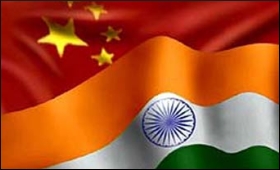|

|
Is there a China-India race in Africa?
|
|

|
|
| Top Stories |
 |
|
|
|
Rajiv Bhatia | 15 Nov, 2010
Once again Prime Minister Manmohan Singh asserted recently, while answering a journalist, that the world was large enough to accommodate the growth ambitions of both India and China. In a similar vein but speaking specifically about Africa, a senior official in India's Ministry of External Affairs observed, at a recent seminar in Delhi, that India-Africa partnership "stands on its own", thereby denying indirectly that China had anything to do with it. Characterising it as "an old relationship, very mature and productive", he aptly remarked that it "has worked for us and for them (i.e., Africans)".
Thanks to geographical proximity, age-old knowledge of sea winds that determined travel by dhows across the Indian Ocean, and a long history of trade and cultural exchanges, India's ties with the eastern coast of Africa had flourished for long. Shared experience of colonialism deepened this affinity, reinforced by large-scale migration of Indians to eastern and southern Africa. In the struggle against colonialism and apartheid, India and Africa were comrades-in-arms. Throughout this interaction going back to centuries, China did not exist as a factor. No wonder Jawaharlal Nehru, India's first prime minister, went around 'introducing' then Chinese premier Zhou Enlai to African leaders at the Bandung Conference in 1955. However, the situation has since changed dramatically, especially in the past decade.
Regardless of how New Delhi projects it, the fact remains that many experts and media representatives in Western countries as well as in Africa, India and China have been commenting frequently on China-Africa relations and India-Africa relations, adopting a comparative approach in evaluating their growth and the challenges they face in the future. Several key points emerge from their analyses.
First, China began a comprehensive, institutionalised approach to dealing with Africa at the continental level through its Forum on China-Africa Cooperation (FOCAC) which has become an influential force since inception in October 2000. India adopted a modified approach which emanated from its consultations with the 54-nation African Union (AU); instead of inviting all member-states of AU, it invited only a handful of them stressing their representative character, to the first India-Africa Forum Summit held in 2008. Programmes of cooperation which emerged from the two processes have been considerably similar.
Secondly, both China and India need Africa's support for their political goals and agenda in world affairs. Both have also been helping Africa to secure a greater say in international governance institutions. Both support Africa in improving its performance to achieve its Millennium Development Goals. Development models of India and China as well as their diplomatic styles have been under constant debate and scrutiny among African countries.
Thirdly, when it comes to 'political visibility', China has been running far ahead of India, with its programme of regular and frequent visits by its president, prime minister, foreign minister and other dignitaries to all regions of Africa - west, east, north and south. Indians ministers do visit African countries, but visits at the VVIP level are still very few. Similarly, visits by African leaders to China are far larger in number than those to India. Apparently this 'visibility deficit' has been factored in by New Delhi recently, with the result that an increased number of high-level visits from Africa to India have taken place in 2010.
Fourthly, economic relations offer a mixed picture. As regards trade, financial aid, project assistance, record of winning energy and mining assets and participation in infrastructure development, China has achieved much greater success. India's investment presence, however, is bigger. India Inc. has focused attention on its core strengths, namely, ICT, small industry, pharmaceutical, automobile and banking sectors as well as assistance for human resource development. But capacity building is not India's monopoly; China too has been helping Africa considerably.
Finally, India's diaspora in Africa is much larger and a more integrated element in Africa's social landscape than Chinese communities present in a few countries, especially where new projects have brought a sizable number of Chinese workers. Potential for the Indian diaspora to contribute to the growth of India-Africa relations is getting realized, but not optimally yet.
A senior European diplomat based in Delhi told me recently: "There is no competition between China and India because the latter is not there!" It is an erroneous view, not borne by facts. On the other hand, to argue that the China factor is irrelevant to India's contemporary approach to Africa too is questionable.
Instead of denying the unfolding competition with China, India could pursue a better option, namely, to acknowledge it realistically, monitor the evolution and implementation of China's Africa policy closely, and deepen pro-actively its own engagement with Africa. Given Africa's needs and India's capabilities as well as track record, cooperation between the two should be expanded much further and faster. This would be the key challenge for the second India-Africa Forum Summit to be held in 2011.
(The author served as India's High Commissioner to Kenya and later to Lesotho and South Africa. He can be reached at rajivbhatia@airtelmail.in)
|
|
|
| |
|
|
|
|
|
|
|
|
|
|
|
|
|
|
| |
| Customs Exchange Rates |
| Currency |
Import |
Export |
US Dollar
|
84.35
|
82.60 |
UK Pound
|
106.35
|
102.90 |
Euro
|
92.50
|
89.35 |
| Japanese
Yen |
55.05 |
53.40 |
| As on 12 Oct, 2024 |
|
|
| Daily Poll |
 |
 |
| Do you think Indian businesses will be negatively affected by Trump's America First Policy? |
|
|
|
|
|
| Commented Stories |
 |
|
|
|
|
|
| |
|